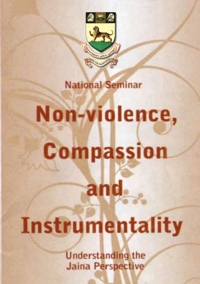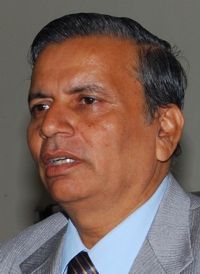 | Non-violence, Compassion and InstrumentalityA Jaina PerspectiveSeminar organized by the Department of Jainology of the University of Madras, 13 and 14 February 2009 Chennai, India |
14.02.2009
2.10 Lessons for Action
The concept of non-violence is a core concept in Jaina Philosophy and all practices and penance ensure strict compliance of the same, be it households or monks. The Seminar has successfully brought about various issues associated with concept and practice of non-violence as these are understood in modem life which is characterized by very high degree of violence. Recapitulation of highlights of the Seminar is imperative for readers who would like to have a glimpse of issues and dimensions of the problem discussed in papers in the two days:
-
The attitude of killing, hurting and not protecting others refers to violence. The converse of this is compassion. In addition to this, when one protects self, it is supreme non-violence and compassion. Killing anyone is killing oneself and compassion for any life is compassion of the self.
-
Changes caused by the same matter through its properties/ attributes can be called real or fundamental cause. Factors which facilitate a change are called as instrumental.
All substances in the universe including oneself (soul) change as per their real (Upadana) nature. However, when one facilitates changes in other substances, one is to serve as an instrument.
-
The great Tīrthaṅkaras as spiritual scientists saw that all life is interdependent and intertwined, although independent in term of their own nature and functioning.
-
Other Religious and Philosophies such as Hinduism, Buddhism, Islam and Christianity advocate non-violence and compassion, but the degree and extent to which it is practiced differs. On the basic concept, there is unanimity in all philosophical thoughts.
-
The Jaina principle of non-violence, compassion or instrumentality could be the basis of scientific ecology of the future. More understanding and research is needed for scientific principles and Jain principles and to formulate guidelines for future ecology and the overall economic and social system.
-
Violence is a passion, a perverted passion. Schools, colleges and universities should have the subject of non-violence and compassion in the syllabus, so that the idea can be imbibed at the formative stage in life.
-
Violence is a preventable disease, says the first global survey by the WHO (World Health Organization) 2005. Like many diseases are eradicated in a planned and systematic manner, there should be movement of eradication of violence in our family, social, political and economic life.
-
The global recognition of non-violence as a solution for peace against terror is accepted by the UNO.
-
Non-violence for plants and animals are now-a-days echoed by environmental science, philosophy and vegetarianism. The same has to be carried forward at different levels for promotion of non-violence.
-
Promotion of NGOs for non-violence in various aspects of individual marital life, family, social life, etc.
-
More workshops and training comps for Ahiṁsā to be conducted. The role model of Mahatma Gandhi - his movement of Satyagraha and non co-operation are two tried and tested methods to resolve various problems.
-
Promotion of value-based cultured documentary films and films like Gandhi, Munnabhai can also change the thinking of the public. Many young men are misguided in the name of religion.
-
In order to promote non-violence and compassion, among many other things, focus on following a self-imposed life of self-discipline for physical, mental, emotional and spiritual health.
-
Think and act with care and concern for all life forms. Exercise compassion for one's higher self and others.
-
Do not attempt to commit suicide or terrorize anyone by thought, word or deed.
-
Forgive and let go the wrong doers as these are external- instrumental factors.
-
Do not make this world ugly with strife, hatred, bloodshed, fear and war.
-
Take the green pledge for an eco-friendly and sustainable life style.
-
Do not impose your views on others and give a patient ear to all concerned.
-
Believe in the power of giving rather than exploiting.
- There are scientific studies suggesting that people who practice compassion produce 100% more DHEA, which is a hormone that counteracts the aging process; 23% less cortisol (the stress hormone) and so on.
 Dr. Jayanti Lal Jain
Dr. Jayanti Lal Jain
